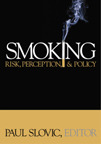Smoking
Risk, Perception, and Policy
- Paul Slovic - University of Oregon, Eugene, USA, Decision Research Institute, Eugene
`This book is a must for everyone concerned about how to address the problem of tobacco use among young people. Virtually all new smokers are children. Many of them are in their early teens and one out of every three children who begin to smoke will die prematurely because of their use of tobacco. This book includes the most objective, thorough and authoritative research to date on the critical question about whether young people fully understand the consequences of their decision to smoke at the time they start and whether they are able to make rational decisions about this vitally important decision. It leaves the reader with no doubt about the value of efforts to better educate our young people and to empower them to resist the lure of tobacco marketing' - Matthew Myers, President, Campaign for Tobacco Free Kids
Smoking presents important controversial research that is based on a survey of several thousand young persons and adults, probing attitudes, beliefs, feelings, and perceptions of risk associated with smoking. The expert board of contributors point out that young smokers give little or no thought to health risks or the problems of addiction. The survey data contradicts the model of informed, rational choice and underscores the need for aggressive policies to counter tobacco firms' marketing and promotional efforts and to restrict youth access to tobacco. An excellent book for anyone studying, researching or working in the field of health.
" This important book reveals why the young start smoking and why, as adults, they regret having started. It is a great contribution to helping end a national epidemic."
"This book is a must for everyone concerned about how to address the problem of tobacco use among young people. Virtually all new smokers are children. Many of them are in their early teens and one out of every three children who begin to smoke will die prematurely because of their use of tobacco. This book includes the most objective, thorough and authoritative research to date on the critical question about whether young people fully understand the consequences of their decision to smoke at the time they start and whether they are able to make rational decisions about this vitally important decision. It leaves the reader with no doubt about the value of efforts to better educate our young people and to empower them to resist the lure of tobacco marketing."
". . . Clearly written, well documented, provocative . . . incorporates theory from the fields of psychology, economics, advertising, and communication to challenge popular beliefs about the nature of addiction."










